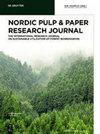Technical kraft lignin from coffee parchment
IF 1.2
4区 农林科学
Q3 MATERIALS SCIENCE, PAPER & WOOD
引用次数: 0
Abstract
Abstract The biomass deconstructed by kraft process and the lignin dissolved in the black liquor are burned to generate energy in a pulp mill. This study used the black liquor from coffee parchment cooking, a residue from the coffee industry, to isolate kraft technical lignin. The parchment was subjected to the kraft pulping process to obtain pulps of kappa number 60 and 25, and the resulting black liquors were used for lignin extraction. Chemical characterization, elemental analysis and heating value of liquors and lignins were performed, as well as FTIR and Py-CG-MS analysis of lignins. The cooking provided liquors with similar characteristics, with lignin content of 31.67 and 32.63% for kappa 60 and 25 liquors, respectively. The extractions resulted in high purity lignin (92.35% for K#60 lignin and 93.96% for K#25 lignin). The higher heating values were 23.8 and 25.4 MJ/kg for K#25 and K#60 lignins, respectively. FTIR analysis showed characteristic peaks of lignin. Through Py-GC-MS, it was possible to observe the slight predominance of guaiacyl-type lignin, which can be an advantage depending on the application. It is possible to extract lignin from the black liquor obtained from the coffee parchment pulping to generate products with high-added value.咖啡羊皮纸中的工艺硫酸盐木质素
摘要硫酸盐法分解的生物质和溶解在黑液中的木质素在纸浆厂中燃烧发电。本研究利用咖啡工业残留物——咖啡羊皮纸蒸煮黑液,分离出硫酸盐工业木质素。将羊皮纸进行硫酸盐制浆工艺以获得卡伯值为60和25的纸浆,并且将所得的黑液用于木质素提取。对木质素和白酒进行了化学表征、元素分析和热值测定,并对木质素进行了FTIR和Py-CG-MS分析。蒸煮提供了具有相似特性的酒,kappa 60和25的木质素含量分别为31.67%和32.63%。提取得到高纯度木质素(K#60木质素为92.35%,K#25木质素为93.96%)。K#25和K#60木质素的较高热值分别为23.8和25.4MJ/kg。FTIR分析显示木质素的特征峰。通过Py-GC-MS,可以观察到愈创木酚型木质素的轻微优势,这可能是一个优势,取决于应用。可以从咖啡羊皮纸制浆所得的黑液中提取木质素,以产生具有高附加值的产品。
本文章由计算机程序翻译,如有差异,请以英文原文为准。
求助全文
约1分钟内获得全文
求助全文
来源期刊

Nordic Pulp & Paper Research Journal
工程技术-材料科学:纸与木材
CiteScore
2.50
自引率
16.70%
发文量
62
审稿时长
1 months
期刊介绍:
Nordic Pulp & Paper Research Journal (NPPRJ) is a peer-reviewed, international scientific journal covering to-date science and technology research in the areas of wood-based biomass:
Pulp and paper: products and processes
Wood constituents: characterization and nanotechnologies
Bio-refining, recovery and energy issues
Utilization of side-streams from pulping processes
Novel fibre-based, sustainable and smart materials.
The editors and the publisher are committed to high quality standards and rapid handling of the peer review and publication processes.
Topics
Cutting-edge topics such as, but not limited to, the following:
Biorefining, energy issues
Wood fibre characterization and nanotechnology
Side-streams and new products from wood pulping processes
Mechanical pulping
Chemical pulping, recovery and bleaching
Paper technology
Paper chemistry and physics
Coating
Paper-ink-interactions
Recycling
Environmental issues.
 求助内容:
求助内容: 应助结果提醒方式:
应助结果提醒方式:


